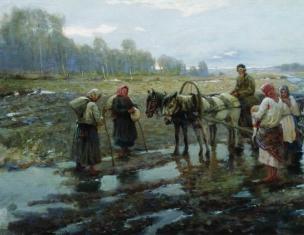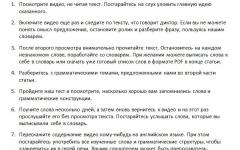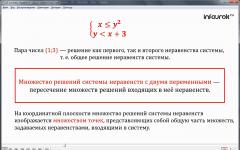Alexander MAYKAPAR
M.I. Glinka
"I remember wonderful moment»
Year of creation: 1840. Autograph not found. First published by M. Bernard in 1842.
Glinka's romance is an example of that inextricable unity of poetry and music, in which it is almost impossible to imagine a Pushkin poem without the composer's intonation. The poetic diamond received a worthy musical setting. There is hardly a poet who would not dream of such a frame for his creations.
Chercher la fe mme (French - look for a woman) - this advice could not be more appropriate if we want to more clearly imagine the birth of a masterpiece. Moreover, it turns out that there are two women involved in its creation, but... with the same surname: Kern - mother Anna Petrovna and daughter Ekaterina Ermolaevna. The first inspired Pushkin to create a poetic masterpiece. The second is for Glinka to create a musical masterpiece.
Muse of Pushkin. Poem
Y. Lotman vividly writes about Anna Petrovna Kern in connection with this poem by Pushkin: “A.P. In Kern's life, she was not only beautiful, but also a sweet, kind woman with an unhappy fate. Her true vocation should have been a quiet family life, which she eventually achieved, having remarried and very happily after forty years. But at the moment when she met Pushkin in Trigorskoye, this was a woman who had left her husband and enjoyed a rather ambiguous reputation. Pushkin's sincere feeling for A.P. Kern, when it had to be expressed on paper, was characteristically transformed in accordance with the conventional formulas of the love-poetic ritual. Being expressed in poetry, it obeyed the laws of romantic lyrics and turned A.P. Kern's "genius of pure beauty".
The poem is a classic quatrain (quatrain) - classic in the sense that each stanza contains a complete thought.
This poem expresses Pushkin’s concept, according to which movement forward, that is, development, was thought of by Pushkin as revival:“original, pure days” - “delusions” - “rebirth”. Pushkin formulated this idea in different ways in his poetry in the 1920s. And our poem is one of the variations on this theme.
I remember a wonderful moment:
You appeared before me,
Like a fleeting vision
Like a genius of pure beauty.
In the languor of hopeless sadness,
In the worries of noisy bustle,
A gentle voice sounded to me for a long time
And I dreamed of cute features.
Years passed. The storm is a rebellious gust
Dispelled old dreams
And I forgot your gentle voice,
Your heavenly features.
In the wilderness, in the darkness of imprisonment
My days passed quietly
Without a deity, without inspiration,
No tears, no life, no love.
The soul has awakened:
And then you appeared again,
Like a fleeting vision
Like a genius of pure beauty.
And the heart beats in ecstasy,
And for him they rose again
And deity and inspiration,
And life, and tears, and love.
Glinka's muse. Romance
In 1826, Glinka met Anna Petrovna. They struck up a friendly relationship that lasted until Glinka’s death. She subsequently published “Memories of Pushkin, Delvig and Glinka,” which recounts many episodes of her friendship with the composer. In the spring of 1839, Glinka fell in love with A.P.’s daughter. Kern - Ekaterina Ermolaevna. They intended to get married, but this did not happen. Glinka described the history of his relationship with her in the third part of his “Notes”. Here is one of the entries (December 1839): “In the winter, my mother came and stayed with my sister, then I moved there myself (this was the period of completely deteriorated relations between Glinka and his wife Maria Petrovna. - A.M.). E.K. recovered, and I wrote a waltz for her for the orchestra in B - major. Then, I don’t know for what reason, Pushkin’s romance “I Remember a Wonderful Moment.”
Unlike the form of Pushkin's poem - a quatrain with cross rhyme, in Glinka's romance the last line of each stanza is repeated. This was required by law musical forms. The peculiarity of the content side of Pushkin's poem - the completeness of thought in each stanza - Glinka carefully preserved and even enhanced through the means of music. It can be argued that in this he could be exemplified by the songs of F. Schubert, for example, “Trout,” in which the musical accompaniment of the stanzas is strictly consistent with the content of the given episode.
M. Glinka's romance is structured in such a way that each stanza, in accordance with its literary content, also has its own musical setting. Achieving this was of particular concern to Glinka. There is a special mention of this in the notes of A.P. Kern: “[Glinka] took from me Pushkin’s poems, written by his hand: “I remember a wonderful moment...” to set them to music, and he lost them, God forgive him! He wanted to compose music for these words that would fully correspond to their content, and for this it was necessary to write special music for each stanza, and he spent a long time worrying about this.”
Listen to the sound of a romance, preferably performed by a singer, for example, S. Lemeshev), who has penetrated into his meaning, and not just reproducing sheet music, and you will feel it: it begins with a story about the past - the hero remembers the appearance of a wondrous image to him; the music of the piano introduction sounds in a high register, quietly, lightly, like a mirage... In the third verse (the third stanza of the poem) Glinka wonderfully conveys in music the image of a “rebellious impulse of storms”: in the accompaniment the movement itself becomes agitated, the chords sound like rapid pulse beats (in in any case, this is how it can be performed), sweeping short scale-like passages like flashes of lightning. In music, this technique goes back to the so-called tirates, which are found in abundance in works depicting struggle, aspiration, impulse. This stormy episode is replaced in the same verse by an episode in which the tirades are heard already fading, from afar (“... I forgot your gentle voice”).
To convey the mood of the “wilderness” and “darkness of imprisonment”, Glinka also finds a solution that is remarkable in terms of expressiveness: the accompaniment becomes chordal, no stormy passages, the sound is ascetic and “dull”. After this episode, the reprise of the romance sounds especially bright and inspired (the return of the original musical material is the very Pushkin revival), with the words: “The soul has awakened.” Reprise musical Glinka's corresponds exactly poetic reprise. The ecstatic theme of love culminates in the coda of the romance, which is the last stanza of the poem. Here she sounds passionately and excitedly against the background of an accompaniment that wonderfully conveys the beating of the heart “in ecstasy.”
Goethe and Beethoven
IN last time A.P. Kern and Glinka met in 1855. “When I entered, he received me with gratitude and that feeling of friendship that marked our first acquaintance, without ever changing in his character. (...) Despite the fear of upsetting him too much, I could not stand it and asked (as if I felt that I would not see him again) for him to sing Pushkin’s romance “I remember a wonderful moment...”, he performed this with pleasure and brought me to delight! (...)
Two years later, and precisely on February 3 (my name day), he was gone! He was buried in the same church in which Pushkin’s funeral was held, and in the same place I cried and prayed for the repose of both!”
The idea expressed by Pushkin in this poem was not new. What was new was its ideal poetic expression in Russian literature. But as for the world heritage - literary and musical, one cannot help but recall in connection with this Pushkin masterpiece another masterpiece - the poem by I.V. Goethe " New love - new life"(1775). In the German classic, the idea of rebirth through love develops the thought that Pushkin expressed in the last stanza (and Glinka in the coda) of his poem - “And the heart beats in ecstasy...”
New love - new life
Heart, heart, what happened,
What has confused your life?
You are filled with new life,
I don't recognize you.
Everything that you were burning with has passed,
What loved and desired,
All peace, love for work, -
How did you get into trouble?
Limitless, powerful force
This young beauty
This sweet femininity
You are captivated to the grave.
And is treason possible?
How to escape, escape from captivity,
Will, to gain wings?
All paths lead to it.
Oh, look, oh, save me, -
There are cheats all around, not myself,
On a wonderful, thin thread
I'm dancing, barely alive.
Live in captivity, in a magic cage,
To be under the shoe of a coquette, -
How can I bear such a shame?
Oh, let me go, love, let me go!
(Translation by V. Levik)
In an era closer to Pushkin and Glinka, this poem was set to music by Beethoven and published in 1810 in the cycle “Six Songs for Voice with Piano Accompaniment” (op. 75). It is noteworthy that Beethoven dedicated his song, like Glinka’s romance, to the woman who inspired him. It was Princess Kinskaya. It is possible that Glinka could know this song, since Beethoven was his idol. Glinka mentions Beethoven and his works many times in his Notes, and in one of his discussions dating back to 1842, he even speaks of him as “fashionable,” and this word is written on the corresponding page of the Notes in red pencil.
Almost at the same time, Beethoven wrote a piano sonata (op. 81a) - one of his few programmatic works. Each part has a title: “Farewell”, “Separation”, “Return” (aka “Date”). This is very close to the theme of Pushkin - Glinka!..
Punctuation by A. Pushkin. Quote By: Pushkin A.S.. Essays. T. 1. – M.. 1954. P. 204.
Glinka M. Literary works and correspondence. – M., 1973. P. 297.
On this day - July 19, 1825 - the day of Anna Petrovna Kern’s departure from Trigorskoye, Pushkin presented her with the poem “K*”, which is an example of high poetry, a masterpiece of Pushkin's lyricism. Everyone who values Russian poetry knows him. But in the history of literature there are few works that would raise as many questions among researchers, poets, and readers. Who was the real woman who inspired the poet? What connected them? Why did she become the addressee of this poetic message?
The history of the relationship between Pushkin and Anna Kern is very confused and contradictory. Despite the fact that their connection gave birth to one of the most famous poems poet, this novel can hardly be called fateful for both.

The 20-year-old poet first met 19-year-old Anna Kern, the wife of 52-year-old General E. Kern, in 1819 in St. Petersburg, in the house of the president of the St. Petersburg Academy of Arts, Alexei Olenin. Sitting at dinner not far from her, he tried to attract her attention. When Kern got into the carriage, Pushkin went out onto the porch and watched her for a long time.

Their second meeting took place only six long years later. In June 1825, while in Mikhailovsky exile, Pushkin often visited relatives in the village of Trigorskoye, where he met Anna Kern again. In her memoirs, she wrote: “We were sitting at dinner and laughing... suddenly Pushkin came in with a big thick stick in his hands. My aunt, next to whom I was sitting, introduced him to me. He bowed very low, but did not say a word: timidity was visible in his movements. I also couldn’t find anything to say to him, and it took us a while to get acquainted and start talking.”

Kern stayed in Trigorskoye for about a month, meeting with Pushkin almost daily. The unexpected meeting with Kern, after a 6-year break, made an indelible impression on him. In the poet’s soul “an awakening has come” - an awakening from all the difficult experiences endured “in the wilderness, in the darkness of imprisonment” - in many years of exile. But the poet in love clearly did not find the right tone, and, despite Anna Kern’s reciprocal interest, a decisive explanation did not happen between them.

On the morning before Anna's departure, Pushkin gave her a present - the first chapter of Eugene Onegin, which had just been published. Between the uncut pages lay a piece of paper with a poem written at night...
I remember a wonderful moment:
You appeared before me,
Like a fleeting vision
Like a genius of pure beauty.
In the languor of hopeless sadness
In the worries of noisy bustle,
And I dreamed of cute features.
Years passed. The storm is a rebellious gust
Dispelled old dreams
Your heavenly features.
In the wilderness, in the darkness of imprisonment
My days passed quietly
Without a deity, without inspiration,
No tears, no life, no love.
The soul has awakened:
And then you appeared again,
Like a fleeting vision
Like a genius of pure beauty.
And the heart beats in ecstasy,
And for him they rose again
And deity and inspiration,
And life, and tears, and love.

From the memoirs of Anna Kern we know how she begged the poet for a sheet of paper with these verses. When the woman was about to hide it in her box, the poet suddenly frantically snatched it from her hands and did not want to give it back for a long time. Kern begged forcibly. “What flashed through his head then, I don’t know,” she wrote in her memoirs. By all appearances, it turns out that we should be grateful to Anna Petrovna for preserving this masterpiece for Russian literature.
15 years later, composer Mikhail Ivanovich Glinka wrote a romance based on these words and dedicated it to the woman with whom he was in love - Anna Kern’s daughter Catherine.
For Pushkin, Anna Kern was truly a “fleeting vision.” In the wilderness, on her aunt’s Pskov estate, the beautiful Kern captivated not only Pushkin, but also her neighboring landowners. In one of his many letters, the poet wrote to her: “Frivolity is always cruel... Farewell, divine, I’m furious and falling at your feet.” Two years later, Anna Kern no longer aroused any feelings in Pushkin. The “genius of pure beauty” disappeared, and the “harlot of Babylon” appeared - that’s what Pushkin called her in a letter to a friend.

We will not analyze why Pushkin’s love for Kern turned out to be just a “wonderful moment,” which he prophetically announced in poetry. Whether Anna Petrovna herself was to blame for this, whether the poet or some external circumstances were to blame - the question remains open in special research.
On May 20 (June 1), 1804, the founder of Russian classical music, who created the first national opera, was born - Mikhail Glinka. One of his most famous works, in addition to operas and symphonic plays, is romance “I remember a wonderful moment”, based on poems by A. Pushkin. And the most amazing thing is that both the poet and the composer different times inspired by women who had much more in common than just one last name between them.

The fact that Glinka wrote a romance based on Pushkin’s poems is actually very symbolic. Critic V. Stasov wrote: “Glinka has the same significance in Russian music as Pushkin in Russian poetry. Both are great talents, both are the founders of the new Russian artistic creativity, both are deeply national and drew their great strength directly from the indigenous elements of their people, both created a new Russian language - one in poetry, the other in music.” Glinka wrote 10 romances based on Pushkin's poems. Many researchers explain this not only by personal acquaintance and passion for the poet’s work, but also by the similar worldview of the two geniuses.

Pushkin dedicated the poem “I Remember a Wonderful Moment” to Anna Petrovna Kern, whose first meeting took place in 1819, and in 1825 the acquaintance was renewed. Years later, feelings for the girl flared up with new strength. This is how the famous lines appeared: “I remember a wonderful moment: You appeared before me, Like a fleeting vision, Like a genius of pure beauty.”

Almost 15 years later, another significant meeting took place: composer Mikhail Glinka met Anna Kern’s daughter, Ekaterina. Later in a letter he said: “She was not good, even something painful was expressed on her pale face, her clear expressive eyes, unusually slender figure and a special kind of charm and dignity... attracted me more and more... I found a way to talk with this sweet girl... Soon my feelings were completely shared by dear E.K., and meetings with her became more enjoyable. I felt disgusted at home, but there was so much life and pleasure on the other side: fiery poetic feelings for E.K., which she fully understood and shared.”


Subsequently, Anna Petrovna Kern wrote memoirs about this time: “Glinka was unhappy. Family life he soon got tired of it; Sadder than ever, he sought consolation in music and its wondrous inspirations. The difficult time of suffering gave way to a time of love for one person close to me, and Glinka came to life again. He visited me again almost every day; He put a piano in my place and immediately composed music for 12 romances by the Puppeteer, his friend.”

Glinka intended to divorce his wife, who was caught in treason, and go abroad with Ekaterina Kern in a secret marriage, but these plans were not destined to come true. The girl was sick with consumption, and she and her mother decided to move south, to a Ukrainian estate. Glinka's mother was strongly opposed to him accompanying them and throwing in his lot with Catherine, so she did everything possible to ensure that the composer said goodbye to her.


Glinka lived the rest of his days as a bachelor. For a long time, Ekaterina Kern did not lose hope of a new meeting, but Glinka never came to Ukraine. At the age of 36, she got married and gave birth to a son, who later wrote: “She remembered Mikhail Ivanovich constantly and always with a deep sorrowful feeling. She obviously loved him for the rest of her life.” And the romance “I Remember a Wonderful Moment” went down in the history of Russian music, like other works by Glinka:
Alexander Sergeevich Pushkin
TO ***
I remember a wonderful moment:
You appeared before me,
Like a fleeting vision
Like a genius of pure beauty.
In the languor of hopeless sadness,
In the worries of noisy bustle,
A gentle voice sounded to me for a long time
And I dreamed of cute features.
Years passed. The storm is a rebellious gust
Dispelled old dreams
And I forgot your gentle voice,
Your heavenly features.
In the wilderness, in the darkness of imprisonment
My days passed quietly
Without a deity, without inspiration,
No tears, no life, no love.
The soul has awakened:
And then you appeared again,
Like a fleeting vision
Like a genius of pure beauty.
And the heart beats in ecstasy,
And for him they rose again
And deity and inspiration,
And life, and tears, and love.
The history of the creation of the poem, to whom it is dedicated.

Anna Kern drawing by A.S. Pushkina 1829
The poem was written no later than July 19, 1825. At this time, Pushkin was forced to stay on the territory of the Mikhailovskoye family estate. The poem “K***” was first published in the famous almanac “Northern Flowers,” the publisher of which was Pushkin’s lyceum friend Anton Antonovich Delvig, in 1827. Pushkin saw Kern for the first time long before his forced seclusion; the meeting took place in St. Petersburg in 1819, Anna Kern made an indelible impression on the poet.
The next time Pushkin and Kern saw each other was only in 1825, when Kern was visiting the estate of her aunt Praskovya Osipova on the Trigorskoye estate; Osipova was Pushkin’s neighbor and a good friend of his. It is believed that new meeting, which took place after such a long break, inspired Pushkin to create an epoch-making poem.
It is known that A. S. Pushkin personally presented the autograph of the work to Anna Kern before her departure from Trigorskoye to Riga, which took place on July 19, 1825, but the autograph, according to her memoirs, was in the manuscript of the second chapter of “Eugene Onegin”, which A. P. . Kern should have been taken with her before leaving. Pushkin unexpectedly took away the autograph and only after requests returned it again (Guber P. Don Juan list of A.S. Pushkin. Kharkov, 1993). Among other things, this exclusive white version was irretrievably lost - apparently, in Riga, in the commandant’s house.
K Kern*
I remember a wonderful moment:
You appeared before me,
Like a fleeting vision
Like a genius of pure beauty.
In the languor of hopeless sadness,
In the worries of noisy bustle,
A gentle voice sounded to me for a long time
And I dreamed of cute features.
Years passed. The storm is a rebellious gust
Dispelled old dreams
And I forgot your gentle voice,
Your heavenly features.
In the wilderness, in the darkness of imprisonment
My days passed quietly
Without a deity, without inspiration,
No tears, no life, no love.
The soul has awakened:
And then you appeared again,
Like a fleeting vision
Like a genius of pure beauty.
And the heart beats in ecstasy,
And for him they rose again
And deity and inspiration,
And life, and tears, and love.
Analysis of the poem “I remember a wonderful moment” by Pushkin
The first lines of the poem “I Remember a Wonderful Moment” are known to almost everyone. This is one of the most famous lyrical works Pushkin. The poet was a very amorous person, and dedicated many of his poems to women. In 1819 he met A.P. Kern, who captured his imagination for a long time. In 1825, during the poet’s exile in Mikhailovskoye, the poet’s second meeting with Kern took place. Under the influence of this unexpected meeting, Pushkin wrote the poem “I Remember a Wonderful Moment.”
The short work is an example of a poetic declaration of love. In just a few stanzas, Pushkin unfolds before the reader the long history of his relationship with Kern. The expression “genius of pure beauty” very succinctly characterizes enthusiastic admiration for a woman. The poet fell in love at first sight, but Kern was married at the time of the first meeting and could not respond to the poet’s advances. Image beautiful woman haunts the author. But fate separates Pushkin from Kern for several years. These turbulent years erase the “nice features” from the poet’s memory.
In the poem “I Remember a Wonderful Moment,” Pushkin shows himself to be a great master of words. He had amazing ability to say an infinite amount in just a few lines. In a short verse, a period of several years appears before us. Despite the conciseness and simplicity of the style, the author conveys to the reader changes in his emotional mood, allowing him to experience joy and sadness with him.
The poem is written in the pure genre love lyrics. The emotional impact is enhanced by lexical repetitions of several phrases. Their precise arrangement gives the work its uniqueness and grace.
The creative legacy of the great Alexander Sergeevich Pushkin is enormous. “I Remember a Wonderful Moment” is one of the most precious pearls of this treasure.








